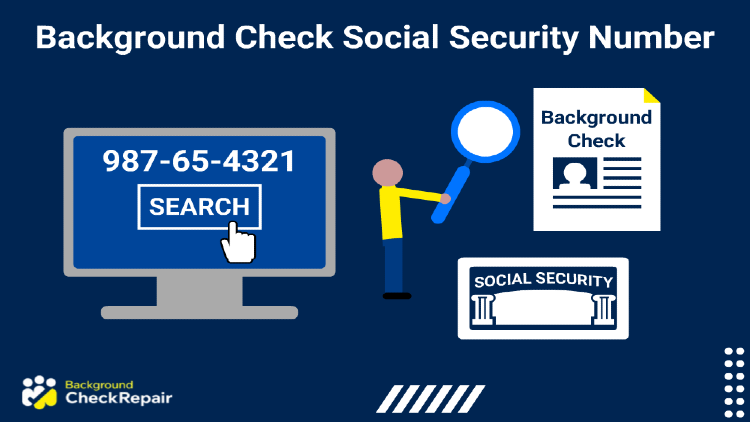
When performing a background check, social security number inclusion helps prevent many of the errors associated with basic name-based level 1 background checks.
This helps ensure that background checks provide accurate insights.
However, there are some things to know about this type of background check before having one run or doing this type of background check yourself.
In order to use social security for a background check, it generally involves providing this private information to a third-party agency, which makes it crucial that the agency itself is Fair Credit Reporting Act compliant. The report generated provides a list of documented names and locations for the SSN5 based on the SSN’s banking and credit record…BUT it’s not that easy.
(Otherwise, criminals could simply enter as many numbers as possible in order to steal identities.)
Anyone can run a background check on someone else (or themselves), using a social security number, if they have it by using a background check agency. But, if it’s being done for professional reasons…federal law requires consent.
This guide goes over everything related to a background check using a social security number, what types of background checks require them, and how to run your own social security number background check right now.
Social Security Background Check vs. Name-Based Background Check: What Is the Difference?
With a name-based background check, the screening uses a first and last name (and middle name if possible) to search criminal records and other public records for information on the person based on the name.
Because names can be the same, usually this type of background check requires additional information to narrow the search, such as:
- A person address
- Next of kin (related people)
- Approximate age, or birth date
However, when an employment background check is employed, the social security number is used to both verify identity and work eligibility, as well as criminal record and other public information.
Note: A name-based background check will also examine national sex offender and child abuse registries.
What’s a Social Security Background Check?
Businesses and individuals can use a background check security number as a research and responsibility tool. Because it checks if a person’s Social Security number (SSN) is authentic, verifies that it reflects their registration details, and provides previously connected localities, one will know which regions or jurisdictions to look for in subsequent searches.
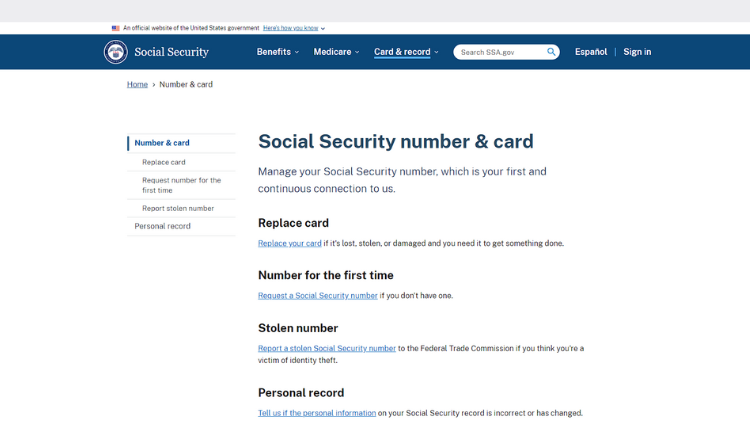
(Image: Social Security5)
When the background check social security number procedure begins, an SSN check is usually launched. An SSN check can assist an individual in figuring out which city or local state criminal history databases to look through. Take into account that an SSN background check differs from proof of identity in terms of what it reveals (and what it doesn’t).1
How It Works
Certain background investigations ask for candidates’ Social Security numbers, whereas others do not. Employers can typically use Social Security Numbers in pre-employment screening because candidates usually provide these details as part of the job application.
It’s worth noting, though, that an SSN isn’t required for a thorough criminal background investigation. Contrary to popular belief, Social Security numbers are not linked to criminal histories. Criminal records are public records; however, Social Security numbers are confidential and private personal information. No criminal history is linked solely to a Social Security Number, and someone cannot search for criminal history by using the SSN.1
What It Uses
Because of these considerations, criminal background checks rely on identifying facts such as a person’s name, fingerprints, or birth date. While providing more information to validate findings is usually beneficial, failing to provide a Social Security Number for a background investigation will not deem a criminal investigation fruitless.
A background check security number can provide further identifiable information that helps with verification. Imagine a person who wanted to obtain a US Alias Search background check from background checks websites. Unlike criminal investigations, this screening uses SSN data straight: it compares the person’s Social Security Number to the SSA’s Death Master Index. It extracts residence documentation and nicknames formerly connected with the Social Security Number. It also confirms the SSN’s region of issuing and time of activation.
What’s a Name-Based Background Check?
A name-based verification matches a person’s personally identifiable data to existing criminal histories to see whether the person has broken the law. This analysis will explore the county, state, and federal criminal records6 using their names, dates and locations, SSN, and other personal information.2
The name-based background investigation is excellent for evaluating a job candidate because it can supply all the information needed to make a judgment. This data can also be utilized to check a person’s schooling, professional certifications, and previous work history. It often involves fewer hours than a background check based on fingerprints.
How Do Employers Verify SSN?
Employers can utilize the Social Security Administration’s online Social Security Number Verification Service to ensure that their employees’ identities and Social Security numbers match the SSA’s database. If differences are discovered, the SSA offers a sample letter (SSNVS) to assist workers and employers in resolving the problem.3
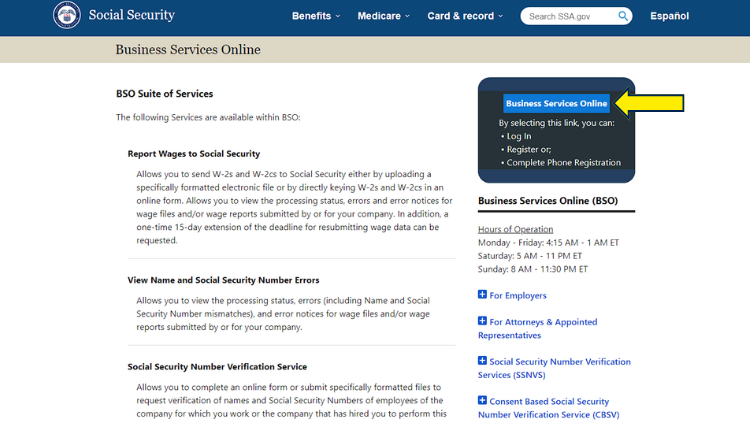
(Image: Social Security10)
To verify an SSN, follow these steps:
Step 1: Give the SSA all the identifying information.
Step 2: Sign up for SSNVS.
Step 3: Request SSNVS access.
Step 4: Log in to SSNVS and activate access.
Step 5: Verify SSNs using SSNVS.
Step 6: Assess the Outcomes
Step 7: Keep the SSNVS registration information up to date.
Conditions for Verifying SSNs
- Identifying Information
Personal submissions for SSN validation must contain the requester’s Social Security Number, name, and birth date for the person whose SSN is being verified. If the person asking cannot provide their date of birth, they must supply some or all of these identifying details:
- Location of birth
- Mother’s maiden name
- The name of their father
- Verification Justification
The person asking must give detailed information for SSA to decide whether the request fits its requirements for dissemination.
Do You Need an SSN for a Background Check? (Do You Need Social Security Number for Background Check)
Here are a few instances where an SSN is not required for a background check. Almost all professional background checks require a social security number to help prevent inaccurate reports and results.
Criminal Background Checks
An SSN is not required for this background investigation. Names, birth dates, and residence are all used to find them. If the applicant possesses a Social Security number, it should be utilized to help identify them first before scans are conducted. On the other hand, a criminal records investigation does not need the SSN. Even without an SSN, a criminal history can be disclosed.
Bankruptcy, Lien, and Judgement Search
A judgment, lien, and bankruptcy search might provide one with details on the individual’s financial past. The court will declare a decision in government, collector’s, and lender’s favor if the person failed to pay tax or was challenged and lost the case for non-payment of lease or loan.
Judgments, liens, and bankruptcy judgments are major financial milestones in a person’s life. In a search, such records will be displayed. One will not be able to examine the individual’s credit card records, but they will be able to see their poor financial background. These civil inquiries expose more information than their money transfer records. So, even if one does not have a Social Security number, one can still conduct due diligence and obtain financial reports.
What Background Checks Require a Social Security Number? The Best Answer
If one needs to conduct a background investigation on someone but doesn’t have their Social Security number, they can do so using a public background investigation site. But, only for personal reasons.
Any professional background check (such as a tenant background check or an employment screening) will ask for an SSN.
Here are a few instances where an SSN is required for a background check.
Credit Reports
When screening purchasers and tenants, most property management companies, renters, and property owners’ associations need a credit report.
Because credit reports contain so much data, it’s a sensible decision. Private data, payment information, credit queries, public data, and collections are all included in credit reports. (It’s worth noting that tax liens and some civil obligations will soon be excluded from credit history.) A credit score may be included in credit reports. Credit reports, without question, are a valuable tool that includes a wealth of useful financial data.
The three major credit agencies (Equifax, Experian, and Transunion) usually need a valid social security number (SSN) to investigate an individual’s credit record. The analysis may not reveal any details, provide incomplete or erroneous data, or eventually display an error when executed without the SSN.
Individual Tax Identification Number
If a person applies for credit or a mortgage using an Individual Tax Identification Number (ITIN),7 those tradelines might become part of the individual’s credit record. Nevertheless, with no SSN, credit agencies are unlikely to acknowledge the ITIN and no data will be issued.
The ITIN was created for tax reasons and was never intended to be used for private transactions. Persons who do not qualify for a Social Security number are given an ITIN. Some renters or facility managers mistakenly provide an ITIN in a credit history request, even though it is not a Social Security number.
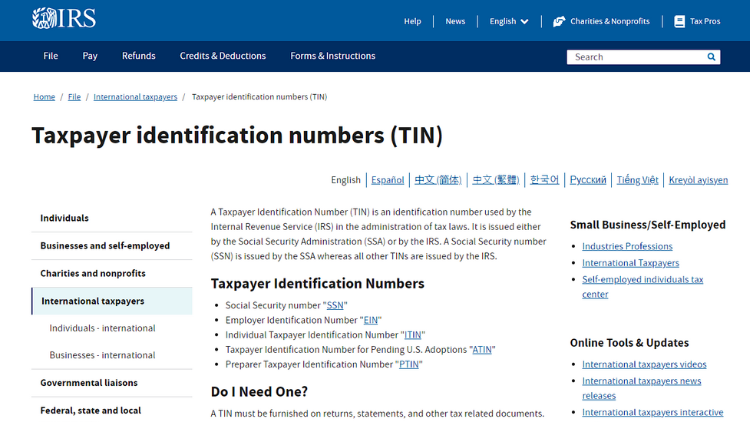
(Image: Internal Revenue Service7)
Tenant Background Check With Social Security Number
In most situations, it is permissible for a renter to request a Social Security number on a rental application (and tenant applicant history) provided that the possible occupant receives assurance and verification that the number will be kept confidential. Furthermore, if the individual does not think the security technique is safe enough, they usually have the choice to decline to supply their number.
Organizations and companies in California, for instance, might need a Social Security number. They must, however, adhere to the regulations governing how that data is maintained, the sort of protection in use on associated web pages, and a variety of other security standards.
Criminal Background Check With Social Security Number
No criminal history is linked solely to a Social Security Number, and no criminal history can be searched by using the SSN. Because of such considerations, criminal background checks rely on identifying data such as a person’s name, fingerprints, or birth date.
Court Case Search by SSN
On court records, only the last four digits are visible. On the other hand, a whole SSN can be utilized to do debtor searches.
What Does SSN Trace Mean on Background Check?
An SSN Trace is a registry lookup that reveals a social security number’s year of issuance, region of issuance, and residence and identity histories. It’s an essential part of a background investigation because it uncovers more information than a simple address or name search.
What Does Your SSN Reveal?
A person’s social security number is used to authenticate their identification. A single name and a single birthday are associated with every social security number. If one has a common name, like John Brown, their SSN, birthdate, name, and other identifying information, like their driver’s license number and previous residences, shared verify that they are the John Brown in inquiry.
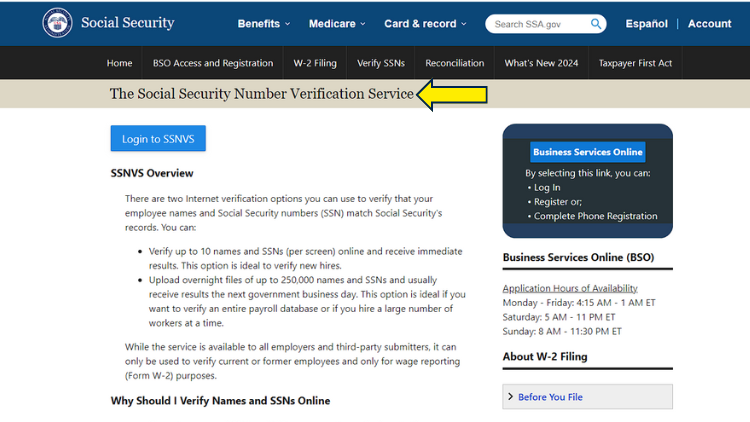
(Image: Social Security9)
Many employers want a potential employee’s Social Security number since it is a quick and easy way to locate them in their database. Furthermore, because social security numbers8 are used to monitor a range of personal activities, a verification pulls information about an individual from a wide range of sources (mail agencies, public documents, and credit agencies). As a result, a person’s social security number can now expose a wealth of information, including past addresses, credit histories, and possibly medical issues.
Can You Look Up Someone’s Social Security Number?
The United States Social Security Administration is one place where anyone can look up a person’s SSN. The United States government provides it as a free service. Every day, users can perform up to ten social security number inquiries on the webpage.
An SSN check is only one of the various background investigation services that can assist businesses in making informed employment decisions. When running a background check, social security number verification and use is an integral part of finding data that a person may have omitted to disclose and a historical timeline of candidates’ identities and residences.
Frequently Asked Questions About Background Check Social Security Number






